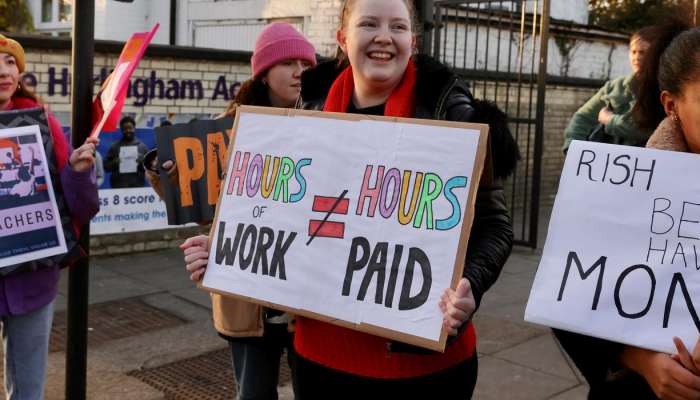
London: About 500,000 people are expected to take part in a massive strike in Britain on Wednesday. Teachers, civil servants, train drivers and university lecturers will take part in the rally demanding pay rises, that would ease a cost-of-living crisis caused by rising inflation.
Authorities expect widespread disruption, with very limited rail services and schools closed.
An Ipsos poll said public opinion was divided about the strike, with 40% in favor and 38% against the strike.
Why is the UK strike happening
"After years of brutal pay cuts, nurses, teachers and millions of other public servants have seen their living standards decimated — and are set to face more pay misery," said Paul Nowak, general secretary of the Trades Union Congress (TUC), the union umbrella group.
"Instead of scheming up new ways to attack the right to strike, ministers should get pay rising across the economy — starting with a decent pay rise for workers across the public sector," he added.
The TUC said this would be the "biggest day of strike action since 2011." Union leaders also said there would be a strike against a planned law to curb strikes in some sectors.
"We are up front that this will disrupt people's lives, and that is why we think that negotiations rather than picket lines are the right approach," Prime Minister Rishi Sunak's spokesperson told reporters.
Britain is currently seeing the highest level of inflation in four decades, reaching more than 10%. A series of strikes have been going on recently, from health care and transport workers, postal staff, and warehouse employees.
Protesters have been demanding pay raises to help cover the rising costs of living, such as food and energy bills.
Next week, health care workers such as nurses, ambulance staff, paramedics and emergency call handlers are poised to stage walkouts.
Impact of the strikes
Official government data showed that more days were lost to industrial action from June to November than in any six months for the past 30 years. The latest official data shows 1.6 million working days were lost in that period. A total of 467,000 working days were lost to walkouts in November alone.
The Sunak administration said giving in to the demands would only fuel inflation further. "I would love, nothing would give me more pleasure than, to wave a magic wand and have all of you paid lots more," Sunak said Monday during a visit to public health workers.
Sunak has introduced a draft law requiring frontline workers to maintain a minimum level of service during walkouts. He said it is in line with other European nations.
France has also been seeing protests against a proposed pension reform plan.